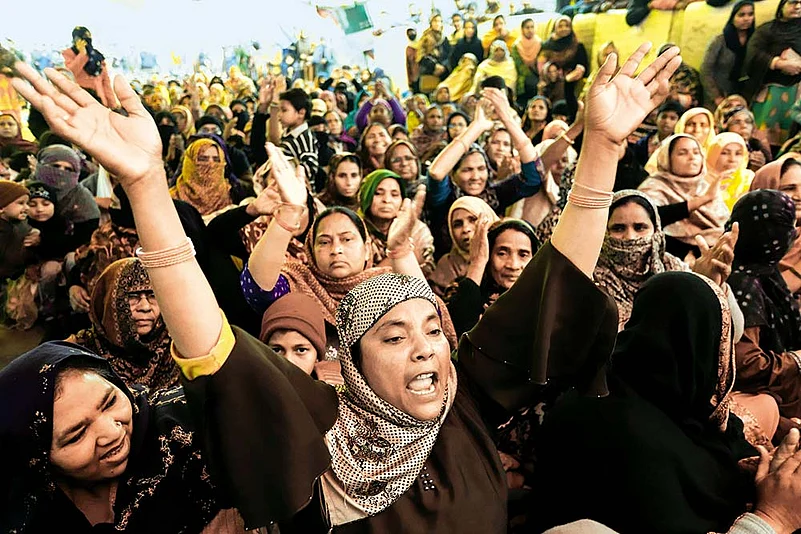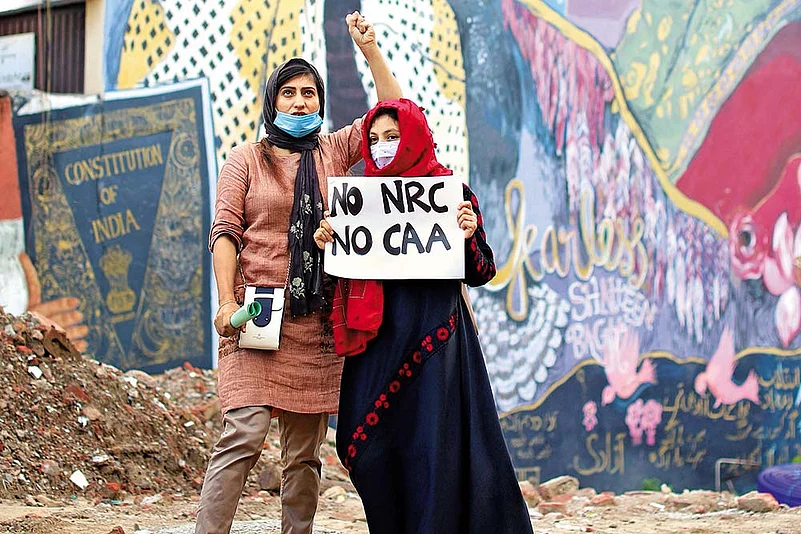Shaheen Bagh has been quiet for the past five months. The iconic protest site, once bustling with music, slogans and crowds, now sees a heavy police presence round the clock. The numerous graffiti and artworks that once adorned the site are now buried under fresh coats of white paint.
Five months ago, it was touted as the epicentre of a popular movement against the Citizenship (Amendment) Act and the proposed National Register of Citizens. Largely helmed by women, the leaderless movement was a historic event.
Though the protest was disbanded due to the pandemic in March, the indomitable spirit of the women remains as resilient as ever. Beneath the silence, there is a brewing consensus to continue with peaceful protests.
Saima Khan, one of the protesters, says that the monumental agitation at Shaheen Bagh is nowhere close to its end. “The protests were halted because of the pandemic. Whenever the protests begin, I am ready to join again. Our demands were not fulfilled,” says the 34-year-old. The three months of the protest have been a learning experience for the mother of four. Along with fighting bigotry and misogyny, Saima has also found her identity and solidarity with women from different strata of society.
Like many others, Saima became a part of the demonstration in response to the violence that broke out at Jamia Millia Islamia on December 15, 2019. She joined a small group of women in Shaheen Bagh that day to protest against the police action against students.
“I was part of the protests from December 15 onwards till the end. It was the first time I participated in a protest. There were only a few people in the beginning, but it grew phenomenally soon,” she says.
The past five months have not been easy for many of the protesters. They say that the government has used the pandemic as an opportunity to arrest anti-CAA activists under the Unlawful Activities (Prevention) Act (UAPA) by pinning the blame for the Delhi riots in February on them. Many anti-CAA protesters are being interrogated and charge-sheeted without following the proper procedure, they claim. The arrested include Pinjra Tod activists Devangana Kalita and Natasha Narwal, charged by the Delhi Police with attempt to murder, rioting and criminal conspiracy.
The movement never lost its momentum and will continue, says Ritu Kaushik, one of the organisers of the protest. An active participant right from the beginning, she has been named in an FIR for ‘obstructing traffic’ and ‘creating law and order issues’. The women had blocked the road connecting Delhi and Noida during the protest. Besides Kaushik, there are FIRs against 22 others for participating in the protests, including housewives.
Kaushik feels that it’s a witchhunt by the government to send a strong message against dissent and part of concerted attempts to denounce the movement. That, however, doesn’t stop her from continuing her protest. Even after the protest was halted in March, she has been actively participating in online protests along with many. “The spirit is undying,” she says. “I am not afraid, come what may. When we joined the movement, our mind was devoid of fear. We are fighting for the right cause.”
Shaheen Bagh was in the news recently after the BJP welcomed “50 Shaheen Bagh protesters” into its fold and AAP claimed that the protests were a brainchild of the BJP. Kaushik says that both AAP and BJP are playing party politics to malign the movement. “The central government and the Delhi government work hand in hand. The BJP used to call the protesters rapists and paid workers. Now, they have welcomed the same people into their party,” she says.
Kaushik’s view is shared by 32-year-old Shabina, one of the organisers who kept vigil at the protest site for days. When Shabina came out of the confines of her home to join the stir, she never imagined that she was going to be a part of the historic movement. Shabina, who runs a beauty parlor in Shaheen Bagh, says that she has become more courageous after taking part in the protests.
The police have slapped an FIR against her, but Khan believes in the power of truth. Her shop has not been running for the past six months, but she doesn’t regret the decision to join the fight against a law that discriminates among people on the basis of religion. “I was confident that we are doing the right thing. It will succeed. With this Hindu-Muslim divide, we are ruining our beautiful country,” says the mother of three.

The women of Shaheen Bagh hope to resume the protest after the pandemic.
She has now reposed her faith in the judiciary. Her next course of action will be based on the Supreme Court judgment on CAA. “I only worry for my children,” says Shabina. “In the past six months, the police have arrested many people. We have the power of truth with us. I am sure it will bear fruit.” Since the protest began, she has seen firing, lathicharge and police intimidation.
For Kahkashan Riyaz, one of the leading organisers, the 101-day protest was similar to a Gandhian satyagraha. Kahkashan feels that the fight against CAA-NRC is going to be a long one. “We know that the government is not going to withdraw the law easily. This is going to be a long haul. After the pandemic, we don’t know what will happen,” says the homemaker. However, she believes that returning to Shaheen Bagh will be a tough call. “Even if there’s a movement, will it be known in the name of Shaheen Bagh?” wonders the mother of three.
Though it was her first experience of participating in a protest, Kahkashan says that it was an empowering one. “We have opened a school for children who accompanied their parents. I taught them along with children from the nearby slum,” says Kahkashan, who still continues to protest online.
Despite threats from many quarters, she continued to protest against CAA, which she felt was an unconstitutional law. “Many people, including students and teachers, have been arrested. It’s wrong to think that they will keep their mouth shut just because they have been arrested. They are not going to be silent forever. We can’t be fearful and run away,” she says.
“I delayed consulting a doctor because I felt that people need me more at Shaheen Bagh. I was so busy that I kept delaying the doctor’s appointment,” says Khalid. She, however, doesn’t regret it. “The two-and-a-half months spent at Shaheen Bagh were a huge learning experience. I ignored my health because the nation was more important for me. I just hope and pray that we live in a peaceful manner.”
It was the power of the peaceful campaign run by women that prompted Amita Bag, 40, to come to Delhi from Calcutta and join them in the struggle against the “black law”. Bag couldn’t stop herself when she read stories about women bringing their infants to the protest site in the Delhi winter. An active participant in the Singur agitation in West Bengal, Bag says that Shaheen Bagh stands out with its non-political character and lack of a leader. She spent three months at the protest site and says that she will return to Shaheen Bagh after the situation improves. Bag is also rallying against CAA-NRC-NPR on social media.
“The movement will again go on the ground once the situation gets better. The online campaign is still on. I am still in touch with the protesters. We will strengthen the movement,” she says.
Bag was wowed by the eclectic mix of protesters. There were activists, students, housewives and grandmothers, and both Hindus and Muslims were at the forefront. “I have participated in many movements, but nothing has ever inspired me like this,” says Bag.


























